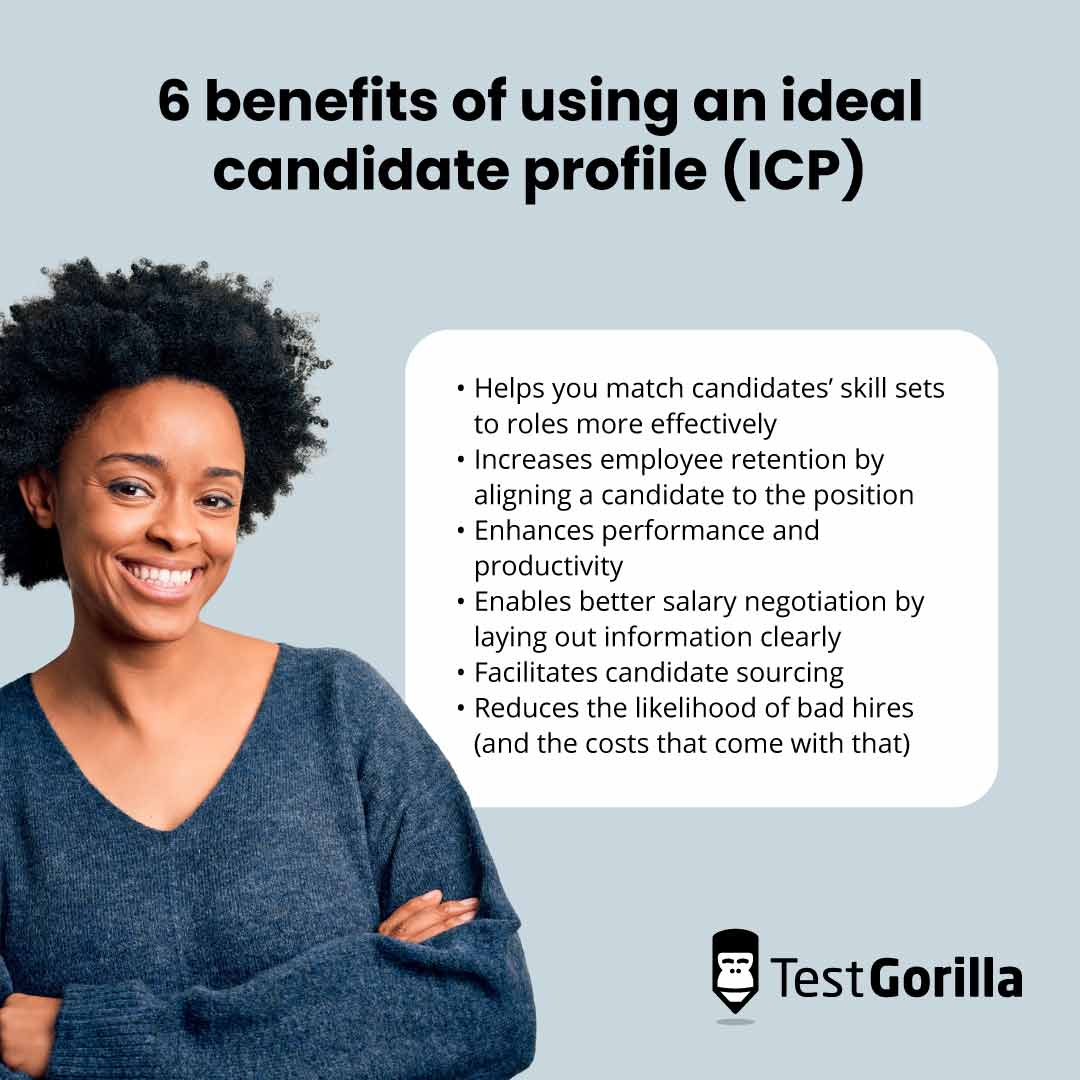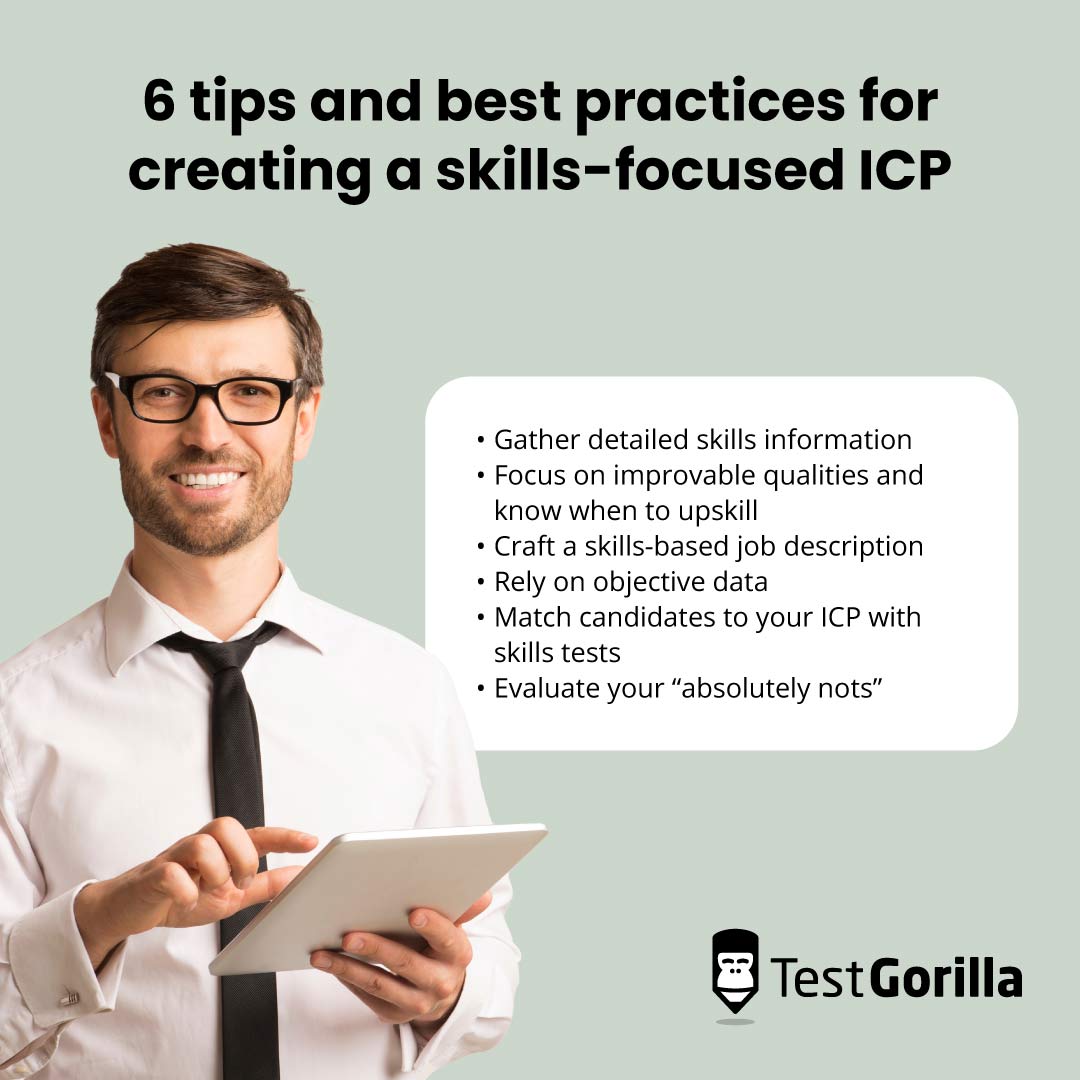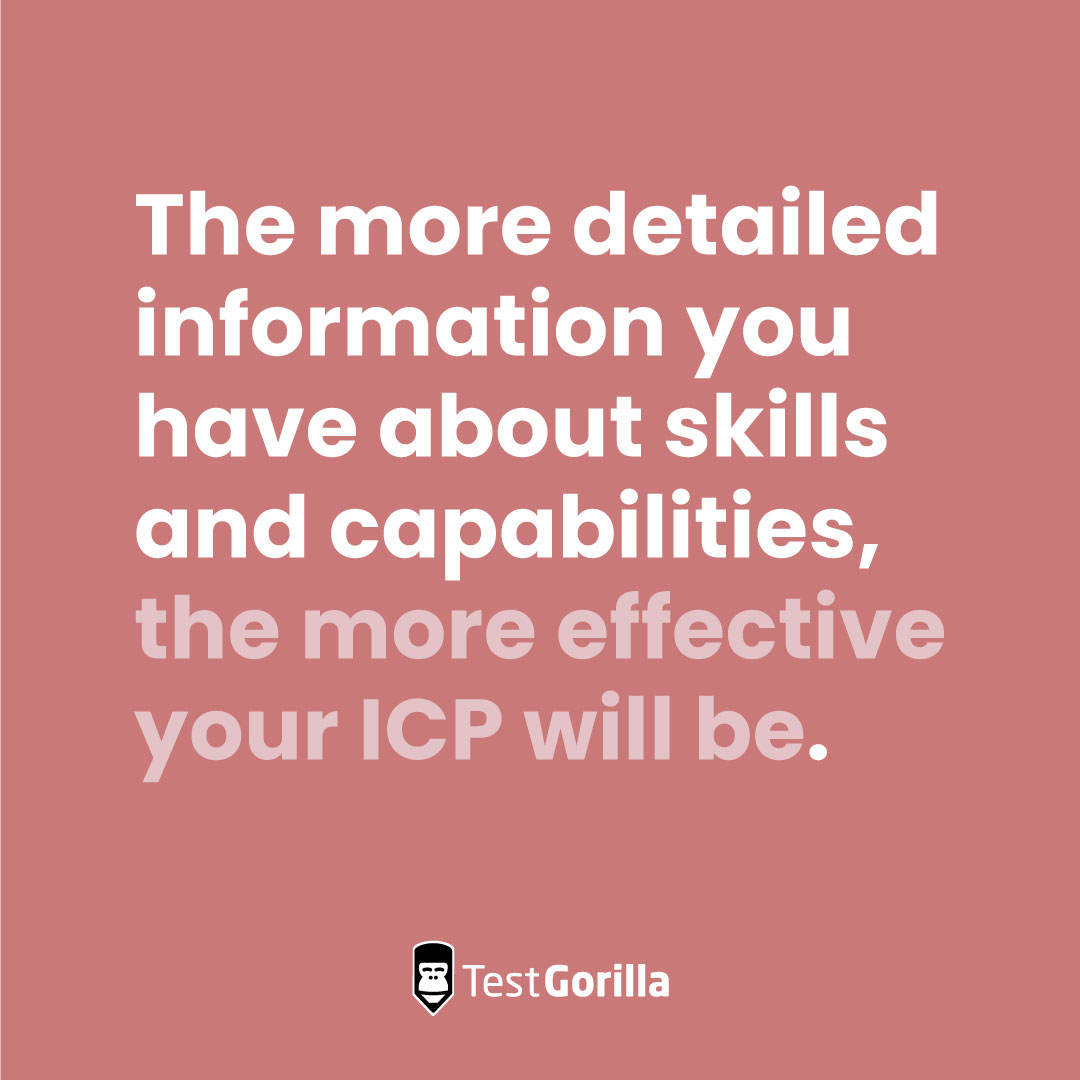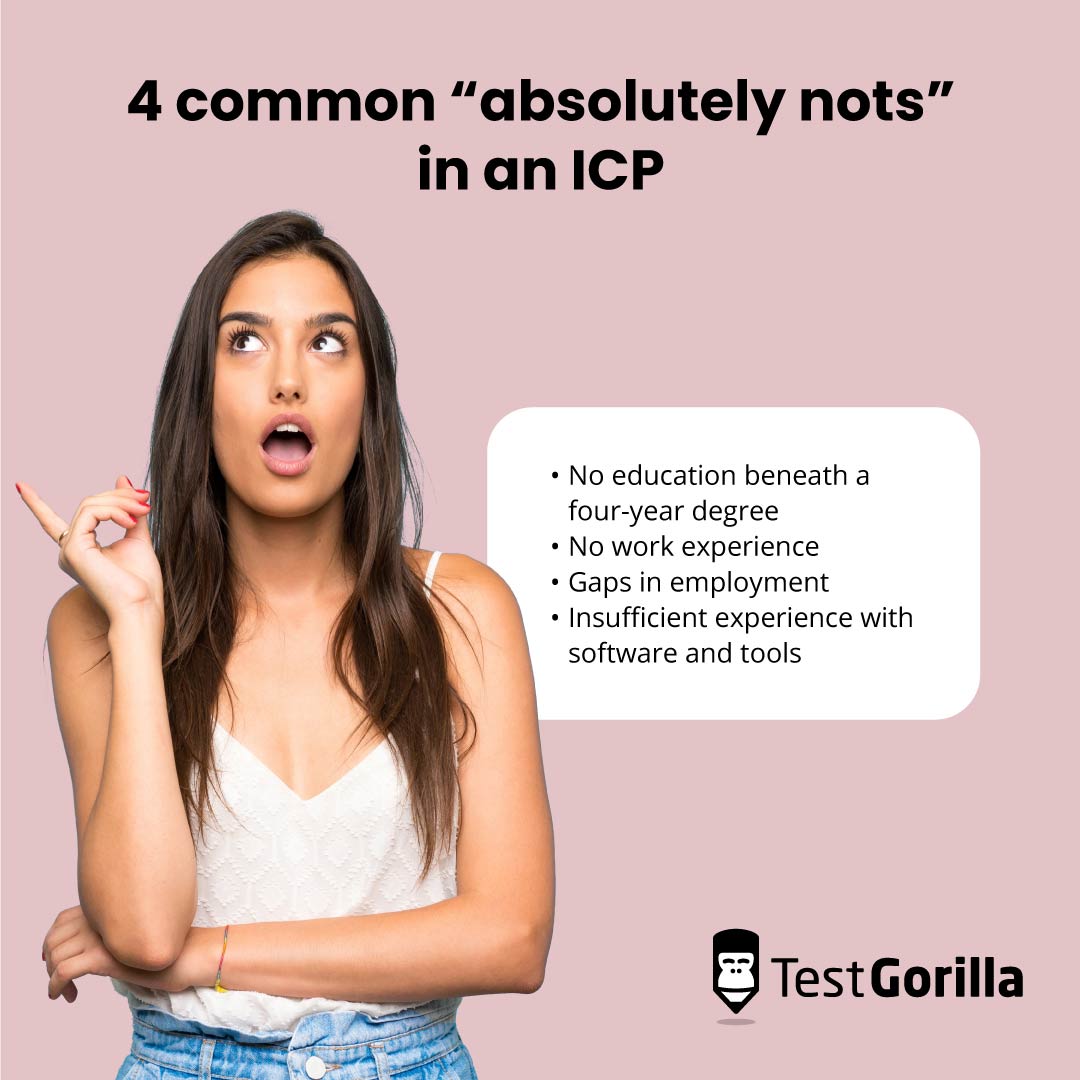How to create a skills-based ideal candidate profile
An ideal candidate profile (ICP) is a common recruiting tactic used by hiring managers. These documents include the ideal requirements for open roles, such as skills, work experience, education, motivation, and career goals.
But a few of those points can be problematic. When you make assumptions about a candidate’s “required” experience and education, it narrows your talent pool – or even worse, it leads to a bad hire.
So what about a skills-based ideal candidate profile?
Developing an ICP that focuses on skills and competencies makes it an even more effective recruitment tool. This article delves into the issues with traditional candidate profiles and explains how to develop skills-based ICPs. We’ve also included an example template for a skills-based ICP at the end.
Table of contents
What does a traditional ideal candidate profile look like?
An ideal candidate profile (ICP) is a document that notes the skills and requirements needed to succeed in a job role. These profiles help hiring managers source and hire talent faster and more efficiently because they know exactly what they’re looking for, ensuring precise candidate sourcing.
Let’s take a quick look at what’s traditionally included in an ICP, along with its main advantages and disadvantages.
What’s included in a traditional ICP
Ideal candidate profiles aim to list out all the qualities that make a person successful in a role, ranging from their skills to their personality.
Here’s what’s generally included in a traditional ICP:
Hard skills
Soft skills
Work experience
Education
Qualifications
Nice-to-have attributes
Most of these points seem quite normal to document, but it starts to get questionable with some of the other factors people add:
Age
Social background
Specific career path
This means you’re imagining your ideal candidate has a specific age and background. All of a sudden you’re not choosing for capability anymore; bias is creeping in.
The drawbacks of using a traditional ICP
Many of these points seem quite standard, but when you include a lot of the points mentioned above, your ICP has the potential to narrow your talent pool.
Listing that your ideal candidate must have three to five years of work experience and a four-year degree filters out candidates with alternative experience, like STAR candidates.
This becomes even more detrimental when you search for a candidate based on age, social background, and career path.
Some ICPs get specific when it comes to an ideal career path: for example, they can ask that a candidate spend one to two years at a startup before moving to a mid-size company. This excludes candidates who have the ideal skills, but not the career you'd expect.
Including age in an ICP is especially problematic. Many ideal candidate profiles specify an age range for a role, such as “an account executive who’s 25 to 35 years old.” Age has nothing to do with a person's ability to get the job done, and placing importance on it only encourages age discrimination.
Including “nice-to-haves” on an ICP may discourage candidates from applying. A famous report from Hewlett Packard found that men apply to a job when they meet 60% of the listed requirements, but most women only apply when they meet 100%.[1]
In sum, traditional ICPs have quite a few issues that prevent great candidates from finding a job and stop you from securing a great hire. But this doesn’t mean you should toss them away entirely.
The benefits of using an ICP
Although traditionally they can be problematic, ideal candidate profiles are still a valuable tool to find quality hires if they’re done right.
Here are a few of the main benefits of an ideal candidate profile:
Helps you match candidates’ skill sets to roles more effectively
Increases employee retention by aligning a candidate to the position
Enhances performance and productivity
Enables better salary negotiation by laying out information clearly
Facilitates candidate sourcing
Reduces the likelihood of bad hires (and the costs that come with that)
No one wants a bad hire, and they happen far more than we’d all like. One study found 76% of senior managers admit to hiring the wrong candidate for a position, and 65% say the negative impact is worse than before the pandemic.
An ICP that lists the right information helps hiring managers seek the capabilities and skills that make a great employee so they can hire the right candidate the first time.
So how do you make “the right” ideal candidate profile? The answer is simple: switch to a skills-based model.
What does a skills-based ideal candidate profile look like?
An ideal candidate profile that focuses on skills is going to change in a few major ways. Namely, it’s going to focus on capability, remove unnecessary “requirements,” and reduce opportunities for bias to creep in.
Below we explain the challenges you’ll face and the benefits you’ll reap from switching to a skills-based ideal candidate profile.
The challenges of a skills-based ICP
The primary challenge is unlearning old behaviors to adopt a skills-based mindset. The urge to gauge a candidate’s talent on their credentials is subconscious in many hiring managers, and looking beyond certain qualifications can be tricky.
Using skills-based ideal candidate profiles also opens your talent pool to a daunting level. You’re no longer looking for a predetermined candidate with a mix of experience and education, but rather skills that could come from anywhere.
This sounds overwhelming, but it also helps you to access many more qualified individuals, which is especially useful during the Great Reshuffle. Building skills-focused ICPs takes a little work, but it’s worth the effort.
💡 One way to shortlist an intimidating amount of candidates is skills testing. Using objective pre-employment tests aligns candidates to your ICP with assessment scores. More on that later. |
The benefits of a skills-based ICP
Ideal candidate profiles were initially designed to reduce bias and focus only on the necessary capabilities, so it isn’t too hard to connect them to skills-based practices.
The original purpose of ICPs was to focus on the exact qualifications and toss away possible distractions, such as biases around charisma in an interview. This means ideal candidate profiles are a perfect fit for skills-based hiring.
Skills-based ICPs remove even more opportunities for bias, making them more effective, inclusive, and efficient. For example, an ideal candidate profile that focuses solely on skills and capabilities puts a stop to harmful age biases. Your profile might now say “data entry specialist with a high typing speed, etc.” rather than “22 to 30-year-old data entry specialist with…”
Focusing on skills also reduces the number of bad hires you bring in. TestGorilla’s State of Skills-Based Hiring report found that 90% of organizations that switch to skills-based hiring reduce mis-hires.
Objectively hiring a candidate for skills and personality also helps you make a suitable candidate-role match. For a deep dive into this topic, check out our blog post on how skills-based hiring reduces mis-hires.
The best insights on HR and recruitment, delivered to your inbox.
Biweekly updates. No spam. Unsubscribe any time.
6 tips for writing an ideal candidate profile that focuses on skills
Skills-based ideal candidate profiles help hiring managers secure better candidates, and now it’s time to make one.
Here are our top tips and best practices for creating a skills-focused ICP:
Gather detailed skills information
Focus on improvable qualities and know when to upskill
Craft a skills-based job description
Rely on objective data
Match candidates to your ICP with skills tests
Evaluate your “absolutely nots”
1. Gather detailed skills information
With a skills-based ICP, you don’t need information about average education level or work experience. You need to gather deep information on:
Technical skills
Cognitive abilities
Soft skills
Personality and culture
These vary from role to role (even with strikingly similar roles), so it pays dividends to research the skills thoroughly.
The more detailed information you have about skills and capabilities, the more effective your ICP will be.
Here are a few ways to gather this essential information:
Talk to employees in similar roles
Review employee performance and talk to high-performers
Talk to managers and hiring managers about their best workers
Speak with subject matter experts and those with information on the current market
Don’t just delve into skills, either – examine competencies, too. If skills are what a candidate does, competencies are how a candidate does them.
Both of these qualities can be assessed objectively, and they both contribute to great employee performance.
For more insights, read our blog post on skills and competencies.
2. Focus on improvable qualities and know when to upskill
Some skills are necessary and some less so, and knowing which is which could be the difference between a good hire and a great hire.
It’s tempting to list skills that seem necessary, but double down and consider if they are.
For example, “high proficiency in Monday.com” isn’t necessary; it can be trained. Try replacing this with “Preferred skill in project management software.”
This is called focusing on improvable qualities, and it’s a crucial part of skills-based hiring. Training candidates in certain areas is certainly doable, and it vastly widens your talent pool.
An example is a candidate who needs upskilling to be fully proficient in task delegation but is otherwise the best manager you shortlisted. Taking the time to train this candidate is definitely worth your while to secure a great new employee.
This focus on continuous improvement not only opens the door for more top talent; it also makes your organization more attractive. One study found 65% of workers think employer-provided upskilling matters a lot when evaluating potential roles, and 48% say they would switch jobs if offered upskilling opportunities.
3. Craft a skills-based job description
Once you have a solid grasp of the skills, competencies, and personality needed to complete the role responsibilities, it’s time to build a skills-based job description.
A job description helps you understand the role you’re trying to fill and lays out a clear, detailed view of the requirements. It also helps future hiring efforts by having all this information in one convenient place.
Q: Why is a skills-based job description better than a traditional one?
A: A skills-based job description is more inclusive of candidates without traditional degrees or career paths, helping you and your whole HR department keep your mind on what’s important.
You can then use this job description to easily and quickly build a skills-based job ad to attract the right talent. If you’d like some tips, check out our job description template.
4. Rely on objective data
Skills-based organizations pride themselves on being objective, and you keep the process as accurate as possible by relying on data.
Use performance metrics and employee feedback to determine which skills and traits are most important to complete the responsibilities. Then bolster that qualitative data with quantitative data from data-driven skills tests to create a complete ICP.
Try gathering data from existing employees with skills tests through a skills gap analysis. A skills gap analysis is when you evaluate your current staff to see where their skill levels are. This not only helps you find the skills this role requires but also if there are any skills your team is lacking.
This way, your new hire can also complement current skill sets by adding in skills you didn’t have before.
5. Match candidates to your ICP with skills tests
It might seem like there are endless possibilities when you’re looking for skills and not for education, work history, and age, but skills tests are a certain way to find a candidate who matches your profile.
Pre-employment testing enables you to build an assessment with tests that measure all of the skills listed in your ICP, like critical thinking skills and people management.
These tests also help you stick to your beliefs and commit to skills-based hiring. You wouldn’t want to build a bias-free ICP only to have unconscious bias slip in during recruitment.
Using skills tests also creates a consistent hiring process:
Assess current employees with skills tests to discover required skills
Build an ICP with these skills
Evaluate candidates with the same skills tests
Invite candidates who score highly to the next stage of hiring
This way, the same tests that built the ideal candidate profile will also be the ones that hired the new employee.
Skills tests are also much more effective than traditional hiring methods, such as screening resumes. A recent study found 78% of HR professionals say the quality of their organization’s hires has improved due to skills assessments.
An ideal candidate profile is a tactic that can reduce mis-hires and improve quality of hire, but it’s a recipe for success when combined with skills testing.
6. Evaluate your “absolutely nots”
Many hiring managers include their “absolutely nots” in an ICP: attributes that automatically exclude a candidate from the hiring process.
Here are a few common ones:
No education beneath a four-year degree: This one has unfortunately gotten popular in the past 20 years, worsening the issue of degree inflation
No work experience: It’s a common misconception that a candidate needs relevant work experience in a field to succeed
Gaps in employment: Many hiring managers see work gaps as a red flag, but it’s worth your time to help employees return to work
Insufficient experience with software and tools: Lacking skills with certain software may seem like an immediate no to some recruiters, but most tools can be quickly and easily taught
These are the type of “absolutely nots” that can get in the way of a great hire, so it’s important to be careful with what you consider a deal-breaker.
For example, a strict rule requiring a four-year degree automatically screens out 76% of Black candidates, 83% of Hispanic candidates, and 81% of rural American candidates.
It’s also important to remember that many skills can be taught. It would be unfortunate to eliminate a candidate based on a quality that could be taught or isn’t relevant to the role.
Q: What makes a decent “absolutely not” for your ideal candidate profile?
A: Try making your “absolutely nots” certain toxic personality and cultural traits that could lead to an asshole genius. But, in general, we recommend populating an ICP primarily with what you want, not with what you don’t want.
An example of a skills-based ideal candidate profile
Let’s take a quick look at an example skills-based ideal candidate profile for a B2B sales rep.
This ICP can get as simple or as detailed as you need – customize it to suit your open roles and organization.
Sample ideal candidate profile:
Title: Sales representative
Team: Sales team
Job classification: Full-time
Objectives:
Foster sales relationships to build prospect and lead pipeline
Sell to our target market
Measurable outcomes:
Meet monthly sales quotas
Requirements
Skills:
Qualifying leads
Managing prospects
Overcoming objections
Negotiation
Communication
Time management
Problem-solving
Competencies:
The ability to read a customer’s feelings
The ability to adapt to customer reactions
The ability to maintain confidence and composure
Cultural traits:
Goal-oriented
Team player
Motivated
Now take a look at pre-employment assessments that would help you hire for this ICP:
Outside Sales test
Salesforce CRM test
Communication test
Negotiation test
Culture Add test
All of these tests and more are available in our test library.
These tests help you evaluate the key skills in the above ideal candidate profile. For example, our Outside Sales test assesses the candidate’s ability to qualify leads and manage prospects; and testing for culture add helps you gauge cultural traits, like being a team player or goal-oriented.
As you can see, skills tests and a skills-based ICP go hand in hand.
Need more guidance on implementing skills-based hiring?
Read our complete handbook for all the tips, tools, and strategies you need to get the most out of this transformational approach to recruitment.
Skills-based hiring 🤝 ideal candidate profiles
An ideal candidate profile is a great tool to narrow your search and find the best possible employee. But traditional methods could do more harm than good. It might be second nature to include work experience and preferred education in an ICP, but that doesn’t mean we can’t unlearn these practices.
A skills-based ideal candidate profile has the same advantages as a standard ICP but with none of the drawbacks.
Ready for the next step in the process? Check out our guide on how to prepare job descriptions for a skills-based hiring approach to create a skills-based job ad.
If you’d like to browse more than 300 skills tests to use in pre-employment assessments, check out our test library.
Sources
Mohr, Tara Sophia. “Why Women Don’t Apply for Jobs Unless They’re 100% Qualified”. (August 25, 2014). Harvard Business Review. Retrieved June 15, 2023. https://hbr.org/2014/08/why-women-dont-apply-for-jobs-unless-theyre-100-qualified
You've scrolled this far
Why not try TestGorilla for free, and see what happens when you put skills first.



















